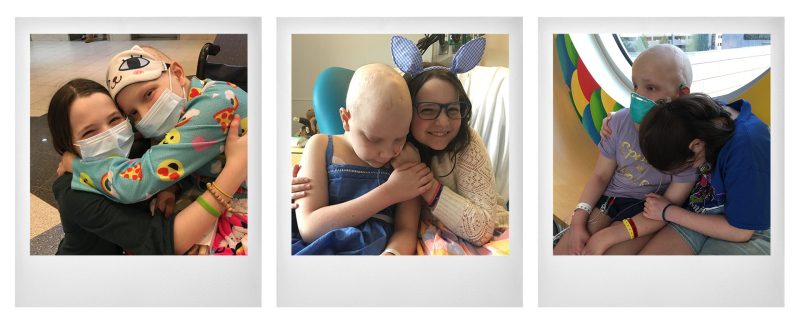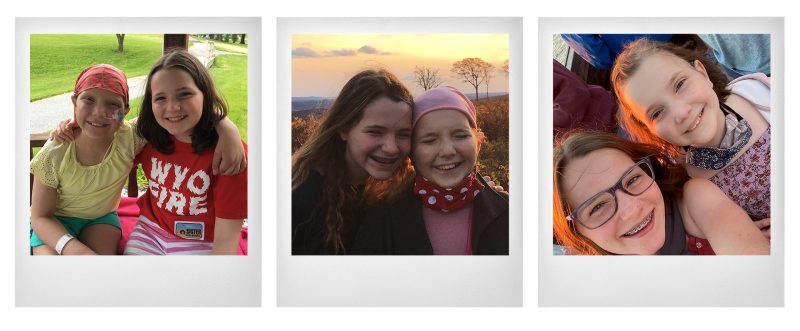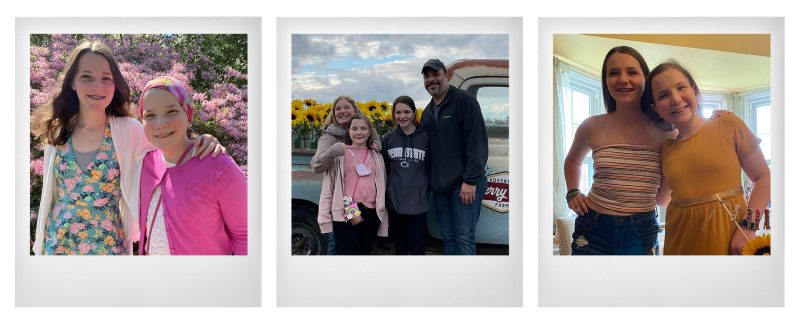Before her cancer diagnosis, Celia was a typical kid. She was shy, loved to dance, played the violin and was no fan of homework. A typical 9-year-old. In August 2018, she was diagnosed with a rare brain tumor (CNS Ganglioneuroblastoma), and according to her mom, Sara, “EVERYTHING changed.”
Some say it takes a village to raise a child, and it takes that and more when a child has cancer. Celia’s treatment required her to be in-patient at Penn State Health Children’s Hospital for 21 days at a time for a minimum of three cycles. Those three cycles turned into five cycles, and then into eight cycles. Celia was in-patient for eight months with a weekend home about every month or so. Sara's job allowed her an indefinite leave, and she stayed with Celia in the hospital from Sunday to Friday. Celia's dad Terry would come up Friday and stay the weekend with Celia. Her older sister, Adeline, would come with Terry on Friday nights and go home with Sara, and then come back on Sunday and head home again. A family of four became two families of two. Two ships passing in the night.

But with this strong family, it was important to still have family time, and that included Friday night pizza. When Terry and Adeline came up on Fridays, it meant stopping for pizza and bringing it to the hospital for a family dinner. Having a constant during such a difficult time was very important to the whole family. However, the highlight of these dinners and visits for Celia was Adeline. She was the strongest force for Celia during her treatment. The promise of her weekend visits and daily FaceTimes kept Celia's spirit strong.
Another constant with being a parent of a child with cancer is worry. The biggest parenting challenge for Sara during Celia’s treatment was the worry of being there for each of her daughters when they each needed something different. When she was with Celia, she worried about Adeline, and when she was with Adeline, she worried about Celia. Sara felt like she was never able to give either of them 100% of what they needed.
While Celia was receiving her cancer treatments, her sister Adeline was figuring out her life as a sibling of a cancer patient. Her parents did their absolute best to make sure that Adeline did not miss out on school, sports, regular activities or events. By immersing herself in her activities, it was a good distraction that did help her have a great academic year at school, including winning the school spelling bee. Academics and activities aside, Adeline did not get to see her mom and Celia very much. Being away from her family was the hardest on her. At school and activities, many kids acted differently toward her. Not different in a bad way, but in a more cautious way since she was the sister of a cancer patient. Everyone knew who she was, and that her sister had cancer.

Celia, now 13, is about to start the eight grade and just celebrated her third anniversary of completing her cancer treatment, and even had a party! While her cancer treatment is finished, she still visits the Penn State Health Children’s Hospital monthly. There were many side effects with Celia’s treatments, and she still sees many specialists and what her mom calls “lots of ologists.” Through it all, Four Diamonds had covered the costs of Celia’s cancer treatment and Sara added, are also covering the costs for “all the ologists.”
For Sara, it was amazing to have the financial support of Four Diamonds for Celia’s cancer treatment, but for her, it is more about the staff that Four Diamonds covers that have always been there for her family that she has found nowhere else. Social workers, child life specialists, music therapists, art therapists and chaplains. The support of their THON organization, Ultimate Frisbee, has also been amazing. From gingerbread houses to attending family events, they continue to support the family. The personal touch of the hospital is tremendous, and she fully believes that is thanks to the funding that Four Diamonds provides for those positions.

Adeline is about to start tenth grade. She just returned from Camp Can Do, which is a summer camp for both childhood cancer patients and their siblings. She said it’s a really great experience and being there with kids who all have something in common made the experience easier and more enjoyable. When asked about her advice to other siblings that might have to go through what she did, she stressed the importance of having somebody to talk to. It doesn't have to be a guidance counselor or a family member, especially when you feel like you can't always talk to family and bother them with additional problems. Adeline also wants other siblings of cancer patients to know that it’s ok not to be ok, even though you aren't the person going through the treatment.
